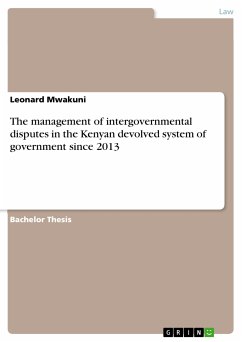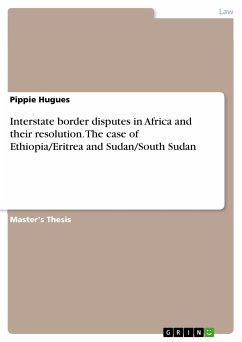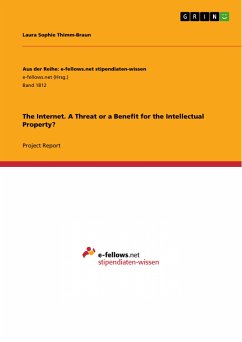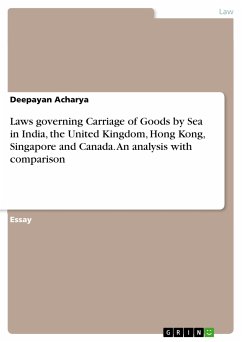Bachelor Thesis from the year 2017 in the subject Law - Miscellaneous, grade: B, Moi University (Annex School of Law), course: Bachelor of Laws (Honours), language: English, abstract: This legal research paper investigates the management of intergovernmental disputes in the Kenyan devolved system since 2013 when the first governments took power under the new Constitution of Kenya, 2010. The constitutional, legal and institutional framework for managing intergovernmental disputes in the Kenyan devolved system is examined. The process of management of intergovernmental disputes effectively for the realization of the objects of devolution in Kenya is accessed. South African jurisprudence on the management of intergovernmental disputes is used because it provides instructive lessons on interpreting the Kenyan constitutional provisions on the management of intergovernmental disputes. The result of this study is that the process of management of intergovernmental disputes in the Kenyan devolved system is a three-tier process. The starting point in the management of intergovernmental disputes is to prevent, minimize and avoid such disputes through intergovernmental relations and cooperative government. Secondly, where avoidance fails, intergovernmental disputes are formally declared and the governments are obligated to resolve such disputes through Alternative Dispute Resolution (ADR) mechanisms so as not to strain their relationships, amongst other reasons. Lastly, the governments are allowed to access the courts as the last resort after all reasonable efforts to resolve such disputes through ADR mechanisms have completely failed. The jurisprudence emerging from the Kenyan courts has been useful in this research. South African jurisprudence on the management of intergovernmental disputes has also been useful on providing instructive lessons on how the Kenyan constitutional provisions on the management of intergovernmental disputes can be interpreted. This legal research paper concludes that purposive interpretation of the constitutional provisions dealing with the management of intergovernmental disputes must be adopted. This is because one of the ways through which the objects of devolution can be achieved in the Kenyan devolved system is through the efficient management of intergovernmental disputes.
Dieser Download kann aus rechtlichen Gründen nur mit Rechnungsadresse in A, B, BG, CY, CZ, D, DK, EW, E, FIN, F, GR, HR, H, IRL, I, LT, L, LR, M, NL, PL, P, R, S, SLO, SK ausgeliefert werden.
Hinweis: Dieser Artikel kann nur an eine deutsche Lieferadresse ausgeliefert werden.









